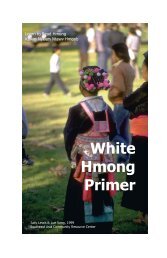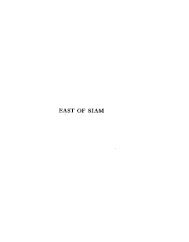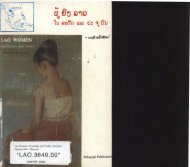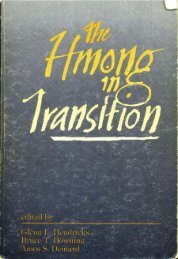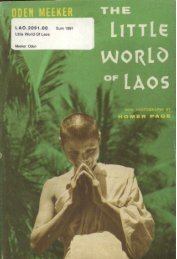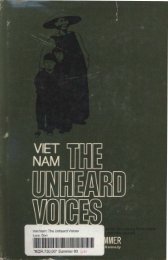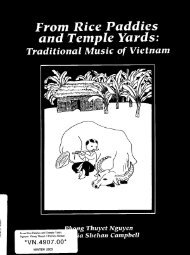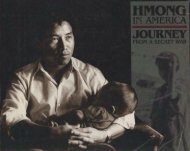PEOPLE
Grant, The Boat People - Refugee Educators' Network
Grant, The Boat People - Refugee Educators' Network
- No tags were found...
Create successful ePaper yourself
Turn your PDF publications into a flip-book with our unique Google optimized e-Paper software.
The Borrt hople<br />
the refugee exodus. The main evidence given for the asseni<br />
from early 1978 it was official Vietnamese policy to drive ou<br />
Chinese from the north was an interview in the domier with<br />
gee described as I former member of the Hdphong public s<br />
bureau's office of alien affain. Hc was quoted as saying<br />
March 1978 the ministry of the interior issued a directive stat<br />
it was government policy to expel ethnic Chinese from the a t<br />
northern Viemam, and that the Haiphong office expanded its a<br />
ties accordingly. Independent intmitws with refugees d<br />
port this: if such a directive were issued, it was more lik<br />
heen in March 1979, after the border war with China than in<br />
1978.<br />
Tho interviews in the same dossier tell mote convincing<br />
A refugee who left Haiphong in early June 1978 add that,<br />
time he dtprrtcd, 60 per cent of Haiphong's 35 000 Chinese<br />
dents had already left, because of rumwrs that Haiphong<br />
a first point of attack if China invaded and that if this<br />
'overseas' Chinese in Haiphong would be rounded up by V~etna<br />
police and imprisoned or executed. The city's administrators<br />
to counter these nunours by mounting loudswkers on trucks<br />
toured the Chinese sectors of Haiphong, bmdcasring that war<br />
unlikely beween the two communist neighbours and that, eve<br />
it should break out, Chinese in Vietnam would not be punished<br />
long as they remained loyal to Vietnam. Spccial editions of Chine<br />
language newspapers and meetings with Chinese leaders<br />
Haiphong were alm held.<br />
The s&e refugee aid that in another place (believed to be Ha<br />
in late May 1978, only 20 per cent of the Chinese residenn had<br />
He believed this was due to better control over news media avail<br />
to the Chinese, as well as the greater difficulty of laving Han<br />
which is inland. In his view, the Vietnamese government tried<br />
pcrsuade Chinese not to leave, because many of them held impoh<br />
positions in industry and mining; the trouble was mused by delib<br />
ate spreading of rumours intended to panic the Chincse. It w<br />
for him to understand why Chinese in southern Vietnam wis<br />
leave, as they were traditionally merchants who saw no future f~<br />
themselves in a socialist economy, but Chinese in northern Victnam<br />
Exodus<br />
were different, They were vetenns of the socialist system and<br />
eaed citizens.<br />
Another interview in the dossier, with an ethnic Chinese refugce<br />
who had fonnerly bcen a government employee in northern Vier-<br />
"am, indicates that, while official policy was to encourage Chinese<br />
to remdn in Vietnam, in stntegidly sensitive regions near the<br />
bder with China measures were applied to test their loyalty. He<br />
said tha~ in early February 1978 in the area of Lo<br />
fii, a provincial<br />
capital un the Red River close to the frontier with China, Vietname~<br />
public security forces had escorted to the border those Chinese who<br />
had cume to Vietnam since 1950 and hsd refused Vietnamese citizenship.<br />
Thcy were allowed to take with hem only their clothing.<br />
Subscqucntly, stories circulating in Hanoi and Haiphong that they<br />
would he well treated in China and helped to find good jobs<br />
prompted tens of thousands of Ha throughout Vietnam to journey<br />
by train to Lao Cai and crass into China's Yunnan province.<br />
Initially, Vietnamese authorities allowed those departing to enter<br />
China without a border check. As the numbers increased, the authorities<br />
began confiscating valuables, perhaps in an attempt to deter<br />
ao many from leaving. He wid that, on average, one or two members<br />
of every Chine= family in northern Vietnam had left for China.<br />
Most Chinese in Vietnam did not want to be sent to the countryside<br />
under the government's new cconomic program, so nearly aH wcre<br />
seeking a way out.<br />
While allegations that Hanoi was responsible for the Chinese<br />
exodus art not always borne out by independent interviews with<br />
refugees, neither arc Hanoi's allegations that China was responsible<br />
for instigating these mass departures. The movement out of Viemum<br />
and into China could not be stopped because it was fuejled by a<br />
potent mixture of rumour, panic and rhe increasingly virulent propaganda<br />
war btwccn Peking and Hanoi. Once started, it became selfgenerating.<br />
The hock waves from the northern exodus to China<br />
almost certainly spread to the Chinese community in southern Viernam,<br />
just as nationalization mcavurta and currency reform in<br />
mid-1978, which hit the Chinese-dominated business community in<br />
aouthtm Vietnam hardcst, also had an unsettling effect on Chinese<br />
in thc north.




